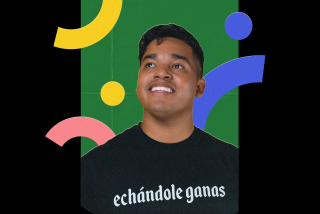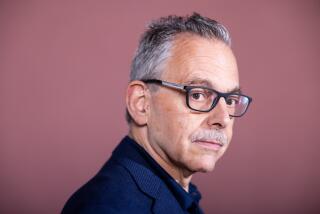MacArthur ‘genius’ winner: This immigrant helps others build good credit
- Share via
Jose Quinonez crossed the border from Mexico to California when he was 9 years old, accompanied by his five siblings, driven out of his home after the death of their father and mother. Three decades later, Quinonez is set to receive one of the most prestigious honors offered to American professionals: a MacArthur Fellowship, known as a “genius” grant.
Quinonez, 45, is among 23 recipients of the award, as a tribute to his work on connecting low-income immigrants to “mainstream financial services,” the John D. and Catherine T. MacArthur Foundation announced Wednesday.
In 2007, Quinonez founded the Mission Asset Fund, a San Francisco nonprofit that reports casual lending practices between immigrants to credit bureaus so that the informal loan payments help build their credit scores.
By formalizing these so-called lending circles, in which a group of immigrants provide interest-free loans and pay one another back gradually, Quinonez is “providing low-income and minority families with the means to secure safe credit, participate more fully in the American economy, and obtain financial security,” the foundation said on its website.
Without credit, it can be impossible to achieve the most basic milestones of financial freedom, such as buying a car, renting an apartment or taking out formal loans.
“We have this notion in our society that poor people are poor because they are broken, or bad, or making bad choices,” said Quinonez, who earned a bachelor’s degree from UC Davis and a master of public affairs degree from Princeton University.
“Here is a successful program based on completely different assumptions about poor people, that there is something good and honest in them, to survive and thrive regardless of the obstacles.”
Quinonez said many immigrants from Latin America, Africa and Asia are already making loans with one another in ways that aren’t captured by American banks, but that should be enough to establish credit history.

His organization acts as a servicer on those loans, by getting people to sign promissory notes, which are legally binding documents ensuring the repayment of the debt, and reporting the exchange to credit bureaus.
To date, the organization has overseen 6,300 loans totaling $6.2 million, Quinonez said. The majority of that lending has happened in California, but the organization operates in 17 states. The program has raised the average participant’s credit score by 168 points, the MacArthur Foundation said.
“Here is someone who has shown himself to be a creative problem solver, and we have recognized him with the fellowship to see what he will do next, what other problems he will solve,” said Cecilia Conrad, managing director of the MacArthur Foundation.
Since he was a child, Quinonez said, he’s been dealing with poverty on a personal level. His father died when he was 2 years old, and then when he was 9, his mother died of lymphoma, something he attributes to their lack of resources.
When he moved to California, he often worked at a flea market with his siblings in order to scrape up enough cash to eat. He had entered the country illegally but eventually got amnesty through President Reagan’s 1986 Immigration Reform and Control Act.
“My siblings, we survived because we bonded together, we helped each other,” he said.
That’s something that drew him to lending circles, which he sees as an example of poor people trying to do right by one another and advance, financially, as a unit.
Those efforts haven’t been recognized by banks or credit agencies – until now.
“All of my work has been to say that there is a lot more to people than we give them credit for,” Quinonez said. Giving them a credit score, he said, is one step in that direction.
Follow me @NatalieKitro on Twitter
More to Read
Inside the business of entertainment
The Wide Shot brings you news, analysis and insights on everything from streaming wars to production — and what it all means for the future.
You may occasionally receive promotional content from the Los Angeles Times.











